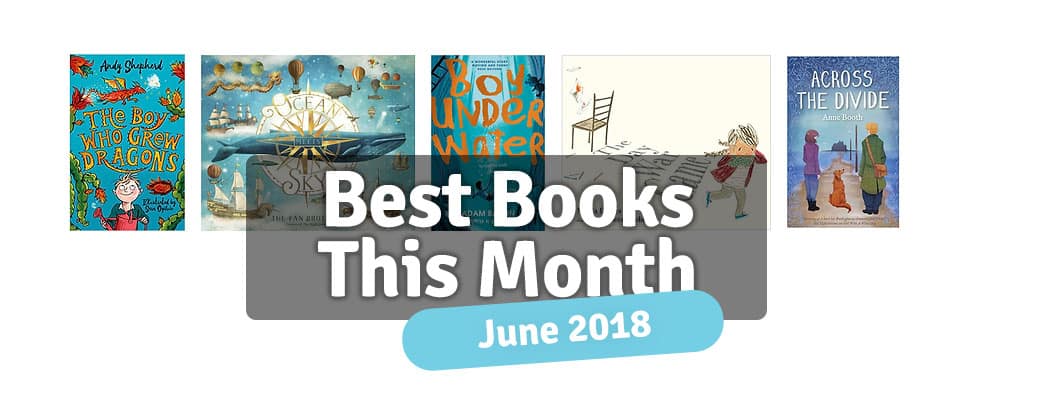It’s easy to feel lost in the flood of so many new children’s books available. Each month, we pick five of our recently published favourites.
Check out our Review Panel’s top picks for you to read in June 2018.


It’s easy to feel lost in the flood of so many new children’s books available. Each month, we pick five of our recently published favourites.
Check out our Review Panel’s top picks for you to read in June 2018.
Imaginative and charming, The Boy Who Grew Dragons is a wonderfully whimsical story that kept me smiling the whole way through. The first in a series, this hugely entertaining adventure about a small boy and his pet dragon makes a super read-aloud for Year 3.
Tomas is busy in the garden with Grandad, planning which fruits to grow that might be turned into delicious jams or tarts. When Tomas stumbles across a strange tree with curious-looking fruit, he never expects that what might emerge from the fruit is a real live dragon! This is an adventure that is humorous at every turn, but also full of heart. Tomas is a great positive role model for showing how young people can apply curiosity and creativity to the process of growing and nurturing plants and see ‘magic’ in the course.
Coupled with charming illustrations by Sara Ogilvie, this early chapter book makes a fantastic choice for newly confident readers just taking off with independent reading and it will also go down a storm as an entertaining story choice.
An original and intriguing picturebook, Ocean Meets Sky is just fabulous. The more times you look at this stunning picture book the more lovely it seems. Dreamlike and ethereal.
This heartfelt and really beautiful story charts a boy’s fantastical journey to a land of dreams and stories that his late grandfather told him about – where the ocean meets the sky. He passes imaginary creatures, giant shells, wondrous islands and magical castles.
There’s so much heart and soul in the illustrations, which capture both the wondrous imagination and poignant longing of the child. The book could inspire artwork or story making, but equally is just a beautiful picturebook to pore over and enjoy.
Boy Underwater is brilliantly funny, unexpected and deeply moving. The plot is likely to bring both tears of laughter and of sadness, and also had me gasping out loud in places too. The book has been awarded the sought-after title of Waterstone’s Children’s Book of the Month for June 2018 and I’m recommending it for Y6+.
Cymbeline and his classmates are ready for their turn to start swimming lessons and most of the pupils are really excited to dive in. But Cymbeline has never been swimming before and the more he thinks about it the more he realises that his mum has actively avoided going to the swimming pool or the seaside. Not wanting to lose face in front of his classmates, Cymbeline googles front crawl, borrows Dad’s old swimming shorts and has a practice in the bath. A sound plan, thinks Cymbeline, until he is unexpectedly pushed into the water at the pool and his whole world begins to unravel.
Little does Cymbeline expect that Mum’s reaction to what happens at the pool might lead to her being isolated in a special hospital, nor does he anticipate the family secrets that begin to rise to the surface. With the help of old and new friends, Cymbeline races against time to uncover the truth about his family and to get Mum back home.
Cymbeline’s narrative voice carries a mixture of cheeky humour, sincerity and a level of naivety that makes him hugely likeable and has the reader rooting for him from the start. Although Cymbeline is just nine, the book is most suitable for readers a few years older as it is tremendously sad in parts (as always I suggest reading it first to assess suitability based on your knowledge of the pupils in your classroom) and the narrative touches on some difficult topics including mental health, domestic abuse and family separations.
Adam Baron has masterfully created the perfect blend of humour and pathos, and (without wanting to give away any spoilers) the twists and turns in the plot are simply brilliant and I never predicted the ending. This is a stunning and entertaining narrative that leaves an impact long after you close its pages.
This is a moving picture book, that shares of the initial unwelcome refugees can sometimes face when arriving in a new place. The story tells of the love of children in a class, naive to the politics of the world, inviting other children into their world by giving up their own chair in the classroom and opening up their community to refugees. Emotive in its nature, with a potent message about the power of kindness and hope, the book ignited a campaign where people posted images of empty chairs as symbols of solidarity with children who had lost everything to war in their home countries. Published in association with Help Refugees, it is a powerful tool for opening up discussions about the ongoing refugee crisis to younger readers.
Across the Divide is a contemplative story about war and pacifism, about making a stand and about seeing different viewpoints. The story explores what happens when people with dissimilar experiences and viewpoints find a way to listen to each other’s voices and seeks ways to progress based on respectfully accepting difference and finding where commonality lies.
The main character, Olivia, finds herself in the centre of bitter arguments and feels caught between sides. Her mum is a peace activist and her grandfather is a vicar who used to serve in the army. When the opening of an army cadet unit is proposed at Olivia’s school, everyone seems to have strong opinions and tension quickly mounts. Olivia feels like she is able to see different sides of the argument and can sympathise with those making a stand for either cause. Before she knows it, things have spiralled out of control and Olivia’s Mum is arrested for leading a pacifist protest against the army base.
With her grandparents away on holiday and her mum in custody, Olivia has no choice but to go and stay with her estranged father on the island of Lindisfarne. There is an almost ethereal quality to the beautiful landscape on Lindisfarne and its timeless remoteness gives Olivia plenty of space to think about the different viewpoints dividing her community. Olivia meets William, an old-fashioned and mysterious-seeming boy who lives on the island. William can relate to the way Olivia is wrestling with different ideas about war and pacifism and in talking together the pair help each other to find their own voices and look for a way forward.
In Across the Divide Anne Booth has masterfully crafted a narrative that is deeply contemplative and one that allows different viewpoints to be heard without directing what the reader should conclude. Through Olivia’s story and her interactions with friends and family, the narrative gently depicts how young people can be powerful in their capabilities to stand up for their beliefs and to be instrumental in bringing about positive change in society.


© BooksForTopics 2015-2024
review
Year group(s) the book is most suitable for:
Year group(s) the book is most suitable for:
Does the book contain anything that teachers would wish to know about before recommending in class (strong language, sensitive topics etc.)?
Does the book contain anything that teachers would wish to know about before recommending in class (strong language, sensitive topics etc.)?
Would you recommend the book for use in primary schools?
yes
Curriculum links (if relevant)
Curriculum links (if relevant)
Any other comments
Any other comments